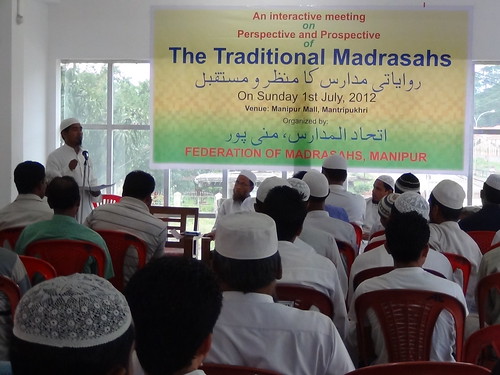By Dr. Syed Ahmed for TwoCircles.net,
Imphal: An interactive meeting on the theme “Perspective and Prospective of Traditional Madrasahs” was organized at Imphal by Federation of Madrasahs, Manipur (FMM) on 1 July 2012. The meeting held at the conference hall of Manipur Hall in Mantripukhri was attended by Muslim intellectuals and leaders, ulema and madrasa students.
Mufti Salatur Rahman, President of FMM, in his key-note address expressed that while discussing the perspective and prospective of our traditional madrasas we need to find answers to some of the basic questions. The questions are: What is a madrasa? What are the subjects included in the syllabus of madrasa? When was the Dars-i-Nizami introduced? Is the present Dars-i-Nizami compatible with our society? What is the outcome of the madrasas in Manipur? Rahman defined and traced the history and development of the madrasas. He also gave an overview of the madrasa education in Manipur indicating some of the areas where special attention has to be given to improve the quality of madrasa education.

The author of this report (Dr. Syed Ahmed) also presented a paper tracing the history and development of madrasa education in India. The paper notes, “The age-old traditions of Islamic education that developed over the centuries in Central Asia and especially under the Abbasids of Baghdad were transplanted to India by the literati and scholars of the region after the Mongols had overrun them in the 13th and early 14th century. Thousands of Muslim theologians, saints, and missionaries fled to India from Iran and Central Asia. Within a century of its foundation, the Sultanate of Delhi came to occupy an unrivalled place in the sphere of Muslim education, and the scholars of Bukhara, Samarqand, Iraq, and others began to look at India for guidance.” The paper mentions that 14 subjects were taught in the madrasa of Firuz Tughluq (1309-1388), which included Fiqh (Jurisprudence), Qirat (Method of recitation, punctuation and vocalization of the text of Quran), Usul-i-Kalma (Principles of Scholastic Theology), Usul-i-Fiqh (Principles of Jurisprudence), Tafsir (Exegesis), Hadis (Traditions of the Prophet), Ma’anl-wa-Bayan (Rhetoric), Nahw-wa-Sarf (Syntax and Etymology), Ilm-i-Nazar (Science of Observation), Ilm-i-Riyadi (Mathematics), Ilm-i-Tibb (Medicine), Ilm-i-Tab’i (Natural sciences), Ilm-i-Ilahi (Metaphysics) and Tahrir-wa-Khat (Calligraphy).
The paper notes that advancement in the madrasa education was seen during the Mughal period with the introduction of rational sciences in the curriculum of the madrasas. The paper notes, “During the reign of Akbar (1556-1605), besides the Islamic studies, subjects of rational sciences like Menstruation, Geometry, Astronomy, Accountancy, Physiognomy, Public Administration, Agriculture, Home Science and Moral Science were included in the curriculum. The introduction of these new subjects helped in preparing a wide range of civil servants. During the period Fathullah Shirazi (d. 1589), Philosopher, Mathematician and Scientist, displayed keen interest in Mechanical and Technical education and under his influence Akbar built a workshop under his own supervision. Mulla Nizamuddin of Firangi Mahal, in Lucknow, developed his system of education on the basis of Fathullah’s system. Maulana Nizamuddin was, in fact, trained in the Fathullah’s traditions. He introduced Dars-i-Nizami.” The paper also assessed the present curriculum taught in some of the prominent madrasas, like Darul-ul-Uloom Deoband, Nadwat-ul-Uloom, Jamiat-ul-Hidaya, etc. and suggested ways to improve the madrasa education system.

In his speech Dr. Md. Raheijuddin Sheikh, Associate Professor of Physics emphasized the need of introducing the study of Science in the madrasas. The Holy Quran deals with various aspects of modern Science, including the creation of the universe (big-bang theory), and further in-depth research need to done, he added.
In his speech Maulana Khurshid Alam, who did his research in Markajul Marif, calls for reforming the Dars-i-Nizami, which is taught in most of the madrasas in the country, by including new modern subjects. In the past the madrasas in India imparted secular subjects such as Science, Mathematics, Astronomy, Philosophy, Geography, Arithmetic and Medicine, besides the Islamic theology. However over the years these subjects were not given much importance in the madrasas. These subjects have to be re-introduced and studied, Alam added.
Md. Habibur Rahman, an official of Wakf Board, Manipur informed the audience about the various programmes taken up by the board, including development of the madrasas in the State.
Addressing the meeting Md. Amin Shah, MLA emphasized the need for modernization of madrasas in the state by introducing modern subjects, like Science, Social Studies, Computer, Maths, etc.

